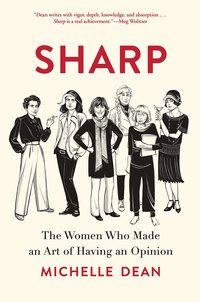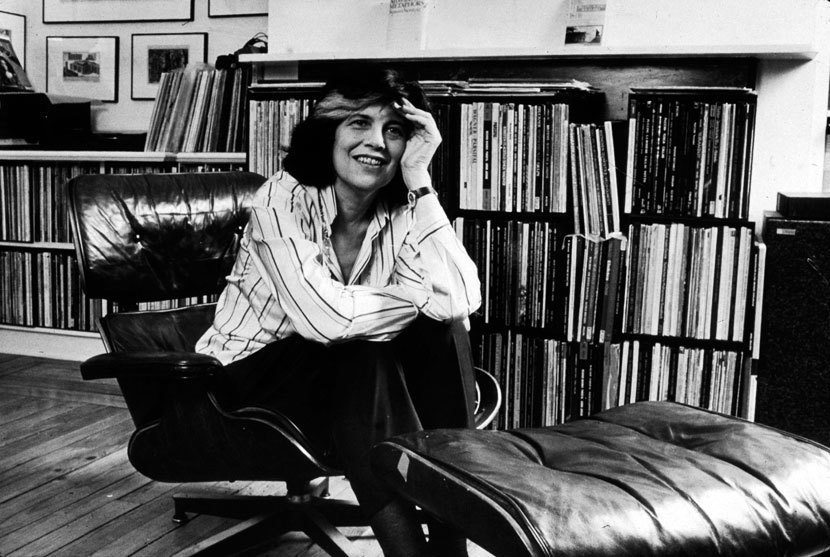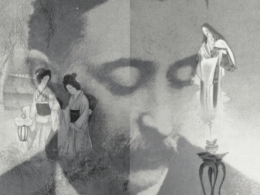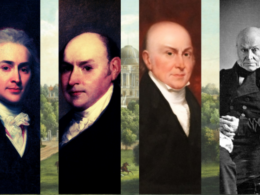Arriving this week from Grove Press, Michelle Dean’s Sharp: The Women Who Made an Art of Having an Opinion is a survey of ten women writers who left their mark on twentieth-century culture, from Rebecca West and Dorothy Parker in the 1920s and ’30s to Renata Adler and Janet Malcolm at the turn of the millennium. Library of America authors Mary McCarthy, Susan Sontag, and Pauline Kael enjoy prominent roles, as do their peers Hannah Arendt, Joan Didion, and Nora Ephron.

What distinguishes all of these writers, in Dean’s telling, are traits encapsulated by the title adjective: wit, verbal precision, and a kind of polemical fearlessness that made all ten women stand out in a culture very much dominated by men. Skillfully braiding critical insight with lively anecdote and biographical detail, Sharp doubles as a history of American literary-intellectual life in the twentieth century—and will undoubtedly leave readers pondering why the work of these writers has aged better than that of many of their contemporaries. It’s a timely book that exemplifies the same qualities Dean finds in her subjects.
Critic and journalist Michelle Dean won the 2016 Nona Balakian Citation for Excellence in Reviewing from the National Book Critics Circle. Via email, she answered our questions about Sharp just prior to the book’s publication.
Library of America: The decision to interweave biographical passages with literary analysis makes Sharp something of a page-turner. Was it always your intention to integrate the material this way, or did the form of the book come together in the course of your research?
Michelle Dean: It was more or less the plan from the beginning. One of the challenges with a book like this is to keep it from sounding like a dissertation. And biography helps give things a narrative shape, that way, that they might not otherwise have. I had to pull people through the twentieth century, and the biographical passages gave them characters to follow.

LOA: From the perspective of fifty years later, it seems fair to argue that a part of Sontag and Kael’s legacies is how they made it acceptable to acknowledge popular culture (or even “trash,” in Kael’s term) both as a source of pleasure—plain and simple—and as a subject worthy of serious attention. How did two critical minds that were so different from each other arrive in somewhat similar territory?
Dean: I admit I think they were actually very similar, though it might not always have seemed that way on the surface. Sontag’s “Against Interpretation” has some philosophical similarities with “Circles and Squares,” Kael’s manifesto against auteurism: Broadly speaking, both were cautioning about getting too abstract in articulating your love of art. They were opposing the tendency to over-intellectualize things (which seems a funny thing to say about Sontag, but I genuinely believe it was her aim). And that, actually, I think, is the key to how they both got to the same place on popular culture, too: They relied on their own reactions without regard to philosophical consistency. They were not system-building, they were recording reactions. Which left them able to just consume what interested them rather than what they “ought” to like.
LOA: A recurring theme in the book is the complicated relationships many of these writers had with second-wave feminism, relationships which you parse in careful detail. Are there lessons applicable to the era of #MeToo?
Dean: I’m not sure there are lessons, exactly. But I tried to chronicle some of the ambivalence these writers felt when confronted with something both as chaotic and as dogmatic as a political movement because I think there’s something worth knowing there: That ambivalence with movement politics is part of the deal of being a writer! And that, say in Nora Ephron’s case, your dissatisfaction with and critiques of the movement aren’t really equivalent to a disagreement with feminism.

LOA: Several of the careers you trace in Sharp were nurtured and sustained by illustrious print publications like the old Partisan Review and William Shawn’s New Yorker. Given the evident decline of print culture today, are you ever apprehensive about how the next generation will find its voice, or is the web providing compensations?
Dean: I think there are lots of reasons to worry about the decline of literary culture, but that has less to do with a print/web divide than it does with the fact that the internet has been colonized by large companies like Facebook and Twitter. Those companies chopped up the web in such a way that it’s difficult to find the attention span for a sustained, intelligent piece of writing even if you are the kind of person inclined to seek them out.



